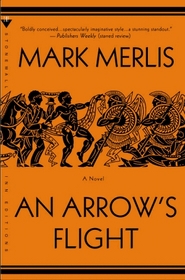Helpful Score: 4
I wasn't sure what to expect when I read this. Though a fan of both mythology and gay fiction, I didn't know how melding the two would work. I spent the first half of the book intrigued by the general concept, admiring the craft in utilizing classical methodology in storytelling - like the destruction of the fourth wall to have a chorus commentary running alongside the narrative - but not really connecting to the self-centered characters. But then, just over halfway through the story, something clicked. A single scene with Pyrrhus rocked me to the core, and I realized that the presentation of the first half hadn't distanced me from the story at all. It had slowly but surely maneuvered me into understanding this young man to the point of being as blindsided by an emotional revelation as he was. I absolutely devoured the last third of the story, desperate to get to the end.
It's not perfect. Several slightly meandering passages scattered throughout the book drag the story. Sometimes they're chorus commentary, others were Phoenix's longwinded stories. There were enough of them to slow me down in reading, and to almost skim when I'd hit another one.
In the end, though, it's a story that gets under your skin and stays there. I definitely recommend it.
It's not perfect. Several slightly meandering passages scattered throughout the book drag the story. Sometimes they're chorus commentary, others were Phoenix's longwinded stories. There were enough of them to slow me down in reading, and to almost skim when I'd hit another one.
In the end, though, it's a story that gets under your skin and stays there. I definitely recommend it.
Helpful Score: 1
The premise of this novel is intriguing: a retelling of the Neptolemus/Philoctetes myth that both of them must be present at Troy for the Greeks to win, finally, the Trojan War, but set in modern times. It is captivating at first, but as the novel wears on, it becomes a jarring context---overall, the novel reads like the memoirs of an aging, early AIDs victim uber-queen---light, chatty, little substance, and the historical backdrop starts to be just that--one dimensional like a high school stage play's cardboard, homemade backdrop. It is an award-winning novel, but other than offering a gay perspective (which by the way, I think might have stood on its own without the artificial historical context), I do not see its literary value.




